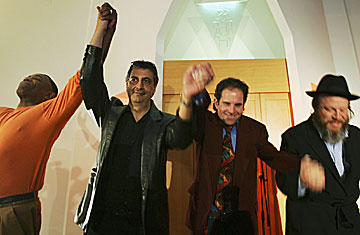
Stand-up comedians Aaron Freeman (L), Ray Hanania (2nd L), Charley Warady (2nd R) and Yisrael Campbell take a bow at the final show of the Israeli-Palestinian Comedy Tour January 31, 2007 in Jerusalem, Israel.
Hanania gets a big laugh, and relief lightens the nightclub air. To the Jerusalem crowd, he may be an Arab, but he's not dangerous — just subversively funny. A few jokes into his routine, Hanania, 53, a U.S. citizen raised in Chicago, is making his Jewish audience laugh at themselves and at the luckless, ordinary Arabs living in the U.S. after 9/11 who are often branded as terrorists by their countrymen.
After the show, Hanania explains how he switched from being a Chicago beat reporter to a stand-up comedian. "These guys stole our land, our homes," he says wryly, "So I read a couple of books on Jewish humor, and I stole their jokes."
Welcome to the "Israeli-Palestinian comedy tour." Organized by Hanania and American-Israeli comedian Charlie Waraday, the January tour took three Jewish and one Arab stand-up comedians to Tel Aviv and three Jerusalem venues, one of them a synagogue. They never made it into the Palestinian territories; two of the comics hold Israeli passports and are banned from travel there. The tour's aim, says Hanania, was to show that "If we can laugh together, we can live together."
The comics are a sight gag in themselves. Waraday's meek demeanor is spiced up with wacky neckties. Aaron Freeman is an African-American Jewish convert who looks as though he just swung off the movie set of Pirates of the Caribbean. The third comedian is Yisrael Campbell, a former Irish-Italian Catholic who became an orthodox Jew. Campbell appears on stage much as he dresses every day around the Holy City — wearing a long black coat, a hat and a Moses-like beard. Black-suited Hanania has the broad-shoulders of a grizzled street tough, either in Chicago or Gaza.
Humor has an edge in the Holy Land. It helps Palestinians and Israelis confront their worst fears. "In Israel, laughter is a necessity, a survival thing," says Waraday. Shortly after a suicide bombing in the Red Sea resort of Eilat, Waraday got an email from a woman who wanted to see the comedy tour. "She said, 'I live in Eilat, and I really need a laugh.' And I thought: 'Wow! That's what its all about.'"
Sitting in the Ottoman-style grandeur of the American Colony Hotel in Jerusalem before a show, Hanania and Waraday trade politically incorrect jokes about the belief, popular among suicide bombers, that 72 virgins await the martyr in paradise. "And what do the women get?" muses Waraday, recalling that a 57-year old Palestinian grandmother recently blew herself up. "What would they possibly have told this woman — that she'll have 72 kids who'll call every day and visit once in awhile? I know my Mom would blow herself up for that."
Hanania laughs and lets rip with his version: "I'm an Arab, so we read from right to left. There's only one virgin, she's 72 years old, and they promise her to everybody. That ain't paradise." Hanania adds, "The best jokes are the ones that take on the toughest topics. If we allow the tough topics to define us, we become prisoners of that crap."
Jews and Arabs may battle over land and religion, but according to these stand-up comics, they share the same kind of self-deprecating humor. In a serious vein, Campbell says, "Downtrodden ethnic groups have a history of humor, and it seems to come out of that tragic experience. Certainly, the Palestinians have lots to talk about in that respect — as do the Jews." Freeman adds with a grin, "Well, Jews have self-deprecating humor and Arab-deprecating humor."
Hanania claims to be one of a dozen Arab comedians still working in the U.S. after 9/11. He corrects himself. "Less than a dozen," he says. The others drifted away from the stage; anger towards Arabs was running too high for jokes. But Hanania says, "Humor is contagious, and it's good. It makes us look at each other as human."
